Dedicated to a culture of sharing between Singapore students in IIUM
Don't wanna be here? Send us removal request.
Text
Grand Ihya’: An ending
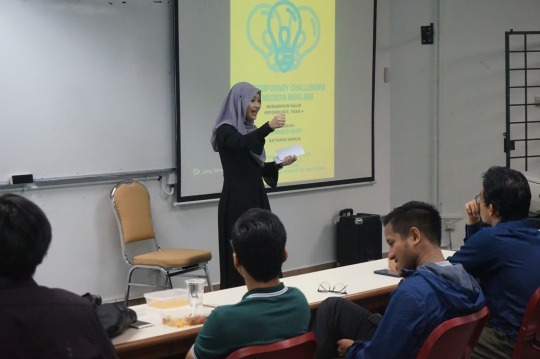
Contemporary Challenges of Modern Muslims - Nurashikin Salim
Modern Muslims: All Muslims that are living in this present time.
To begin with, empty papers were given out to audiences to brainstorm on the contemporary challenges that we, as Modern Muslims, are facing especially in Singapore. The bulk of the factors brewed from secularization and the rest were about the disunity of Muslims.
Before sharing, sister Nurashikin made a very important disclaimer that she is not against establishment but is simply providing the audience with awareness and get them to be more prepared if they were to return to Singapore and settle down for good.
Some of the important points that can be taken from her sharing are:
Contrary to popular beliefs, people thought only national or secular students are a product of secularism however little did the Madrasah students realise that they are also a product of secularism because that's what secularism is all about - removing religion from the daily life.
There are also some other challenges that Muslims in Singapore are facing, namely Singaporean Muslims who declared themselves as feminists and also lesbians.
Some Muslim ministers also touched on Arabisation. However, how about the k-pop wave and westernization? All these should be better termed as globalisation instead.
Discussion about sufi vs salafi in Singapore. How are we supposed to face against all these challenges if we're not united? A suggestion brought by the audience that Salafis should learn akhlak from the Sufis and the Sufis should learn systematic knowledge from the Salafis. It is ideal if we do not put ourselves in a box, however, there is not wrong to label oneself. At the end of the day, all Muslims should be united to defend Islam from false accusations.
All these sharing are to better equipped audiences with the reality that they will be facing. If we truly believe that Islam is a way of life, we need to be smart in tackling the current challenges and at the same time, to be excellent citizens of Singapore.
A woman’s heart - Natasha Dahlia
A sequel to her first session, sister Natasha talks about woman's worth as individuals and how self confidence is an important driving factor to becoming a great Muslimah. It’s crucial that we learn to empower ourselves in order to become independent and to break out of the stereotype that women are weakling beings. The best example would be to look at our dearest Sayyidatina Khadijah r.a. May Allah grant us the strength to become like the exemplary Ummahatul Mukminin and make us one of those who will contribute back to the Ummah Allahumma ameen.
3 notes
·
View notes
Text
Tamazhub: Islamic school of thought
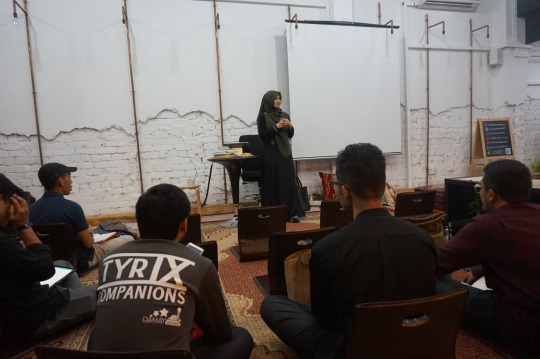
Tamazhub - Ustazah ‘Alaniah Wahid
Did you know? There is more than 4 mazhab?
Tamazhub is the act of following a school of thought. There are many mazahib (i.e plural of mazhab) but only the four prominent ones are those that have been agreed upon together by the scholars; Maliki, Hanafi, Hanbali & Shafi’e.
Following a mazhab started way back during the companions’ time. One may wonder why it is obligatory to follow a particular school of thought. The answer is simply because we are at a time where our status has yet to reach the level of mujtahid and there is little knowledge for ijtihad, hence the need to hold on to a mazhab.
Mazhab is closely related to ethics. In Arabic, ethics can be defined as ‘akhlaq or adab but which on is really the accurate translation? Akhlaq means the knowledge of how we conduct ourselves whereas the latter is more apt for the context as it brings the definition of putting something in its correct place. How mazhab and ethics are link is that both have a similar essence of moral principles that has got to do with the code of conduct.
Looking at the SG context, the questions of which mazhab to follow should come with the basis of understanding the context of the country where multi-racial and harmonious living stands. There is also the factor of policies of the country and the customs (العرف / العادة) of it. But at the end of the day, everyone is obliged to follow one mazhab for their own reference.
1 note
·
View note
Text
Be like the bees
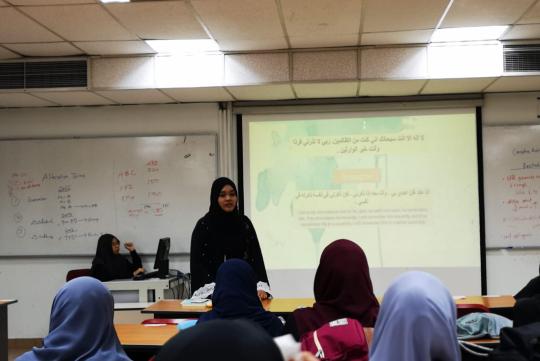
Be like the bees - Shohanah
“Make use of the remedies, honey and the Qur’an” (Tirmidhi, Ibn Majah, Baihaqi)
There’s a lot of things that we can gain from the creation of Allah. Bees are a great example of how a small creature can bring so much value of being a role model to human beings. Some of the things that we can learn are:
Understanding the purpose of life, Eating from pure sources
Mind our relationship
Group productivity
Humility and humbleness
No good deed is too small. Like how, despite producing a small amount of honey, they do not give up.
Way of consultation in demonstrate a system of shura when they want to move their beehive.
The secret behind afflictions and calamities - Rabiatul Adawiyah
Having been through a lot in life, our dearest Sister Rabi shared the important things that we can gain and remember as we brave through ordeals.
1. These are tests on our faith. Stay positive.
2. These afflictions are a way of cleansing our soul.
3. Gratefulness
4. Remembering Allah in times of hardship and calmness.
5. Allah’s power and authority goes beyond our problems.
2 notes
·
View notes
Text
Mawqif: Shariah Law
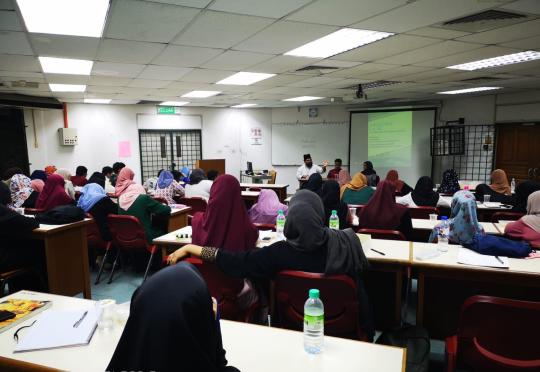
Shariah law: It’s applicability in today’s context - Dr Ramizah Wan Muhammad & Dr Farid Ali
Q: What is shariah law?
Firstly, we have to know that shariah is different from law. They are two different things which do not come together to give a certain meaning. This brings us to the question, what exactly is Shariah?
Shariah is a comprehensive concept where the law and fiqh is under it. Shariah means the straight path, a complete way of life that should be followed and this concept gives justice to the ummah. It is divided into three parts:
- ‘Aqidah and Iman: A strong belief.
- Ibadah: Relationship with God.
- Muamalah: Relationship with humans, our akhlaq and the content that is implemented in Shariah.
The main essence of shariah is (ربانية) which is to believe in Allah. It has started way back during the prophet’s s.a.w time. Even during the ottoman period the legal system was practised such that there is two branches of governing bodies. The governance was in charge of finance, properties and zakah while on the other hand, under the sheikhul islam is where the mufti and the qodhis came from.
Q: Is Shariah law against human rights?
We need to understand that Shariah comes from Allah and because of this, there is no discrimination in it. However in the administration of sharia itself, there might be discrimination and unfairness due to the fact that humans are the ones responsible for this administration.
Rights and duty is not the same. Rights means having the choice to opt it but duty implies an obligation that needs to be done all the time. Example is the right of the husband to discipline the wife and the rights of a father to teach his children. But it is a duty of a man to respect and care for his mother. These rights should always be based on a Qur’anic source.
Q: Why is it so hard for people to accept shariah law?
Without knowledge, one would think that the Islamic criminal law is barbaric but the truth is maybe humans may not agree with this law hence they find it discriminatory in nature. If we were to compare the definition of rights in Islamic and western perspectives, Rights in Islam means how our rights will affect others whereas in Western perspectives it is all about one’s self and not thinking of others. This leads to total freedom which is a different image of how the limited freedom is portrayed in Islam.
Q: Is Shariah Law relevant?
To answer this question, we need to understand that shariah is (نذير و بشير) which means not only that it brings good news to know that if something occurs, the law is there to fix it but at the same time the existence of these rules is to instil fear in order to discipline us. Law is a mechanism and without it, we might think that the world is ours hence its purpose is to guard us from destruction.
For a country to be Islamic, hudud is not the main criteria. But rather integrating the laws of civil and sharia to make a country free of corruption is what matters. To put it simply, Sharia is still relevant without hudud or qisas. What is important is that, the execution of shariah should always be done with wisdom.
0 notes
Text
Arabic language and it’s beauty
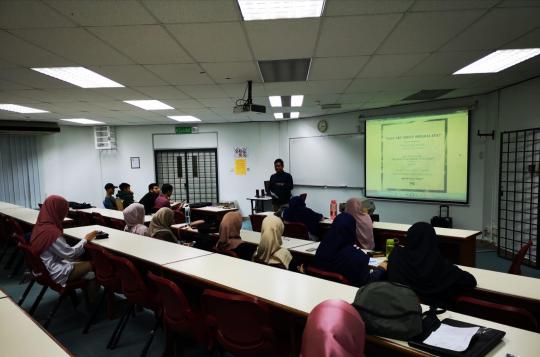
The beauty of Arabic language in Al-Kahfi - Zubair
There is a saying by Ibn Manzur an Arab lexicographer who said “جمال اللغة العربية في نظمه” which means “The beauty of Arabic is in its precision in terms of usage of words”. To prove this, here are two examples that was shared by our dearest brother.
1. In verse 72 & 82, the word {تَسْتَطِيعَ / تَسْطِع} both means would or could but why is it written in different forms? On another note, the former is harder to enunciate compared to the latter. The answer is to look at the context of the verse. In Arabic language, it is believed that every additional language has its function/meaning (زيادة الحرف تدل على زيادة المعنى). Therefore if we look at the context, تَسْتَطِيعَ - with the extra (ي) reflects the hardship faced by Prophet Musa a.s as he could not understand the reason behind Prophet Khidir’s actions whereas تَسْطِع on the other hand shows the easiness of the prophet’s calmness after he understood the wisdom.
2. {وَرَآءَهُمْ} was used in verse 79 to describe the king who was in front of them instead of using the literal term أمام. According to language experts, there is a difference in using the word أمام and وراء. By using the latter, it gives off the interpretation that the king is constantly at the back of their minds hence the usage of وَرَآءَهُمْ.
Subhanallah, indeed the beauty of the Qur’anic language is beyond amazing. The next time we read Al-Kahf, let’s take this opportunity to really understand and ponder over the message behind the words we are reading. Kheyr InsyaAllah!
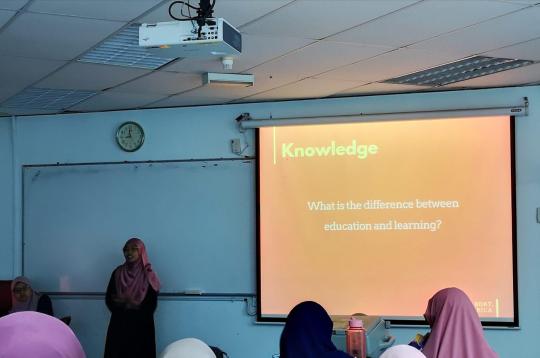
“Lalu aku hidup sebagai apa?” - Syazaa Nizam
Quoted by Hamka, these words should invoke our minds to really think about our objectives being in this world. Often blinded by worldly desires, our greed may overpower the true purpose of being in this world.
1. Money Have the ni’mah of knowing the blessings. Being rich is not a crime but rather with these blessings it’s an opportunity to do good and give charity to others. The trouble comes when one is lavished with great abundance of wealth and yet could not see the gift that Allah has grant them.
2. Knowledge Sure, knowledge is important but the grades and system doesn’t determine our purpose. It is the attitude of students that plays an important part in the education.
3. Power
The solution? Sincerity. Only by constantly renewing our intentions will we stay guided in life. May Allah guide us to be better Muslims ameen.
0 notes
Text
Life and people
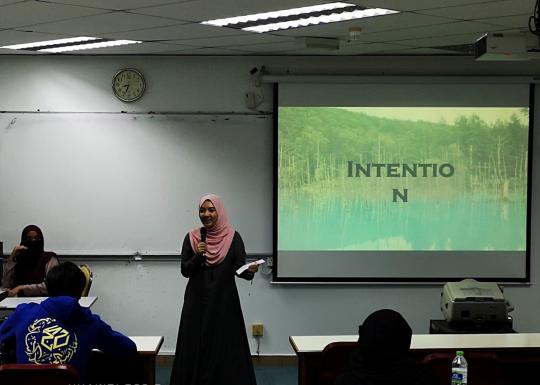
What life has taught me. - Fathin Wafda
A heartfelt sharing by sister Wafda, here’s some of the takeaways that we can get:
1- Always set your intention because having the right intention is what sets you apart from everyone else.
2- Take a risk because who knows the path that has just open is an opportunity from Allah Himself.
3- Be strong and turn to Allah. Remember that every challenge is a test from Him to see if you are positive towards it.
4- Be grateful to everything in life.
5- Always reflect back on the things that you have done and improve yourself as the day goes on.
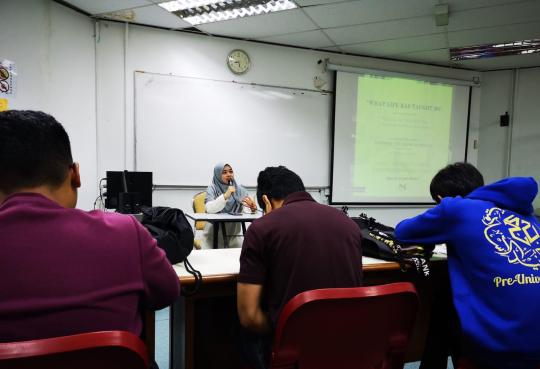
Exposing the rules of people - Farah Nadiah
One of a prominent trait of people is that generally, we love talking to others so here’s a few rules that we can stick to while we encounter our everyday conversation with our friends.
Rule #1: Listen
Rule #2: Never give advice Instead, ask sensible and intelligent questions. E.g: When a friend is complaining and she wants to change major, ask her if that will make benefit more from what she is already gaining now.
Rule #3: Agree without agreeing At times when you disagree with what your friend is talking or complaining about, the least you can do is to respect and validate their feelings. It just takes a simple response of iteration to show that you support them (or at least look like you are supporting them!).
Rule #4: The art of saying “Thank you” and “Sorry” We all love to be appreciated hence we need to know that there is a proper way of showing sincerity in our gratification and our apologies.
1- Get the proportion right. You don’t repeatedly thank someone to show the extent of your appreciation or apologize profusely to emphasize your regret but rather a thank you and sorry may be enough to convey your feelings.
2- Be specific. Don’t assume that your friend knows what exactly you are thanking or apologizing for so be specific for the things that you are thankful/sorry for.
E.g: Hey, thanks for spending time with me today.
Here’s the thing. Why should we bother about ethics? Cos when we make people feel good about themselves, we make ourselves feel good. It is also important that we find balance in our friendship and getting healthy interaction in your conversation and at the same time we get to revive the Sunnah of the prophet s.a.w!
0 notes
Text
Walk The Talk: Talk with knowledge
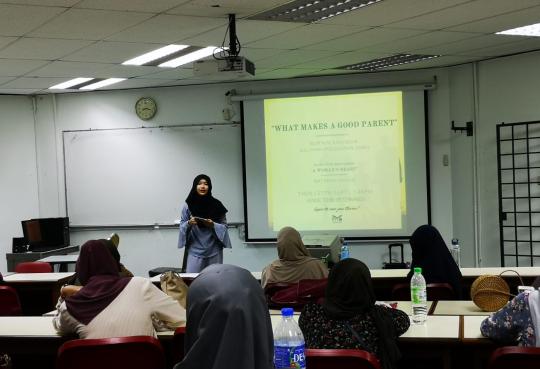
A woman’s heart - Natasha Dahlia
Inspired by two interesting books worth reading, “The forgotten queens of Islam” by Fatima Mernissa and “You can be the happiest woman in the world” by Dr Aid Qarni, our dearest sister Natasha talks about the importance of knowing ourselves and the virtues of being an intellectual woman. We have exemplary women back in Rasulullah’s times such as Sayyidatina Khadijah r.a, a rich business woman, known for her generosity and nobleness. She was an ideal role model, a wonderful wife and a strong support backbone for our beloved prophet s.a.w, physically, emotionally and financially. We also have another great example is Sayyidatina Aisha r.a who despite her young age, was known for her intelligence and credibility. The thousands of authentic hadith would not be possible for our reference today without her contribution. Not forgetting the leading woman Allah sent down on earth, our very first mother, Hawa’, sent to accompany Prophet Adam a.s. One of the valuable takeaway is that as women, we should know that we are gifts from Allah hence we should present ourselves as precious and worthy, and be a reflection of the value and significance of our presence in this world.
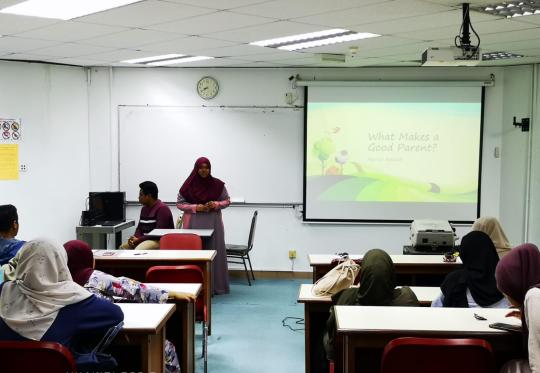
What makes a good parent? - Ain Saleha
Closely related to the topic of being a great woman, sister Ain talks about what makes one a good parent? The term “good parent” here is actually very subjective. To prove her point she shared some of the common cases she experienced as a school counselor interning in a local secondary school. Amongst the cases that she’d dealt with was about parents’ infidelity and displacement of anger towards the children.
As parents, it’s important to know that what works for us, may not work for the children in the future hence the essence of contextualizing. For this to happen we need to have knowledge. As cliché as it sounds, knowledge is power. In fact, sister Ain emphasized that women as housewives are the most important people to get themselves educated because ultimately everything they do will be imitated by their children. Essentially, these family problems can be avoided when we equipped ourselves with knowledge.
So the question here is “What is the benchmark to being a good parent?” The answer is there is no benchmark. Know that as human being, we will definitely messed up but try our best to not mess up our children. Try our very best to be the best parents for them.
0 notes
Text
Me, my identity and my role.
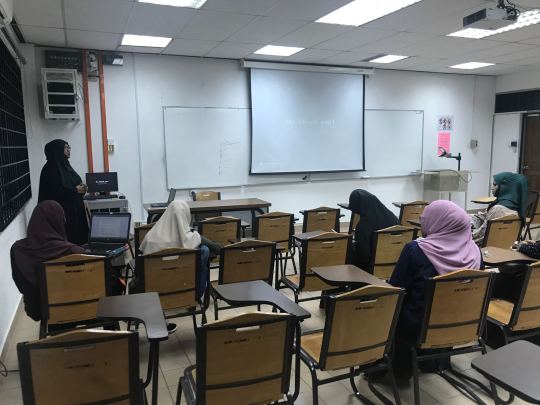
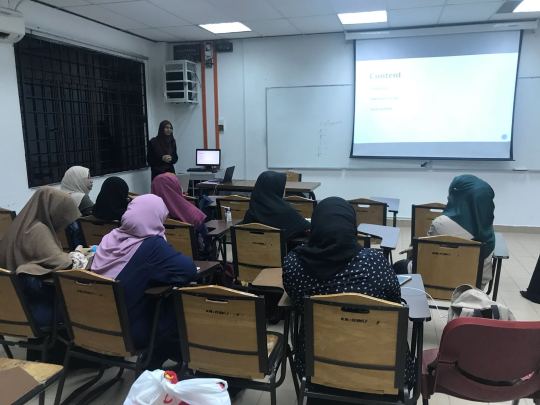
For our mini series, we had a wonderful session with sister Ain Saleha who taught us the importance of knowing our true self. One of the things that we need to realise is that as much as we love and long for company throughout our entire life, in the end there will come a time where we need to be there for our own selves without depending on others. Thus, to be able to achieve this we need to know our own strength and limitations.
As the saying goes, you will never be able to know who you are until you go through this commitment together. It’s a lifelong journey that you take with yourself.
Closely related to the topic of “Me, myself and I” is a sharing session by our beloved sister Shohanah with the topic of our purpose in life. One of the interesting fact we learnt is that Surah Al-Fatihah is in fact a beautiful conversation between us and Allah. It is a dialogue of prayers and a golden opportunity to communicate with your Lord. So remember, the next time you read your Al-Fatihah in your solah take this chance to truly appreciate it’s meaning.
1 note
·
View note
Text
Reality check
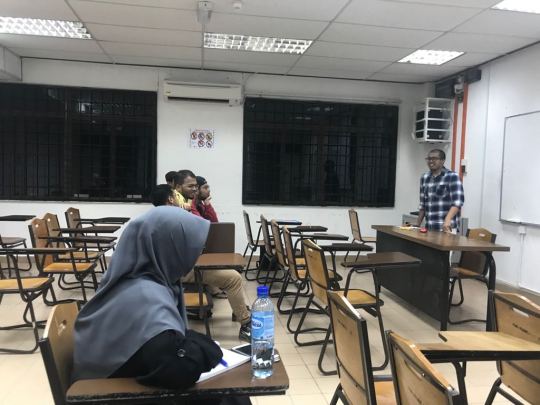
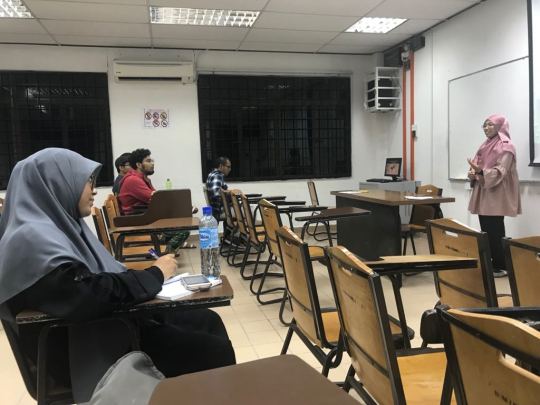
Let’s all take a moment to ask this question to ourselves, “Have we ever sit down and truly ponder about the signs that Allah have sent us?” This week we have sister Syazaa for our mini series, sharing with us the topic of “The science behind signs.”
For example did you know that in a situation of a third-degree burn, the pain reflecting on the last layer of skin is so intense that it causes the nerves to become numb? Thus at this point we are unable to feel anymore pain. That is why in Surah An-Nisa Allah said:
{Indeed, those who disbelieve in Our verses - We will drive them into a Fire. Every time their skins are roasted through We will replace them with other skins so they may taste the punishment. Indeed, Allah is ever Exalted in Might and Wise.} (4:56)
SubhanAllah. Again look at the beauty of the information that He had conveyed to us through His holy book. All we have to do is constantly look around us and continue seeking knowledge. {لِلَّهِ مَا فِي السَّمَاوَاتِ وَالْأَرْضِ ۚ إِنَّ اللَّهَ هُوَ الْغَنِيُّ الْحَمِيدُ} Remember that everything in this world is His army. Nothing is impossible with His will.
Next for our main series we have Brother Zaki with a very interesting topic about the state of the Muslim world. As glorious as the reputation of Islam has been, sadly however the situation of our Muslim brothers and sisters around the world isn’t the same anymore. The issue of a big percentage of the Muslim in the world who has yet to receive Islamic education was brought up. In Singapore itself, the Islamic education only reaches up to 60%. So what happened to the rest of the 40%? Without us realising, the reality is that there is still a huge number of Muslims out there who knows nothing about their responsibility towards Allah and only has Islam on paper as their identity.
Which in all seriousness, as cliche as it sounds, we are all leaders and by default this means that we hold the responsibility towards them. To be able to change the Muslim state may seem impossible but we need to have in our resolution that one day we can make it a better place for the Muslims. One thing for sure, change has to start within ourselves. Allah says in Surah Ar-Ra’d verse 11:
{ Indeed, Allah will not change the condition of a people until they change what is in themselves. And when Allah intends for a people ill, there is no repelling it. And there is not for them besides Him any patron.} (13:11)
We were sent here to study for a reason. Let’s not waste this blessing that He have given us and turn this opportunity to serve a beautiful purpose. May Allah guide us all and make us among those who are always thankful to him Allahumma ameen.
4 notes
·
View notes
Text
Polygamy: Is One Not Enough?
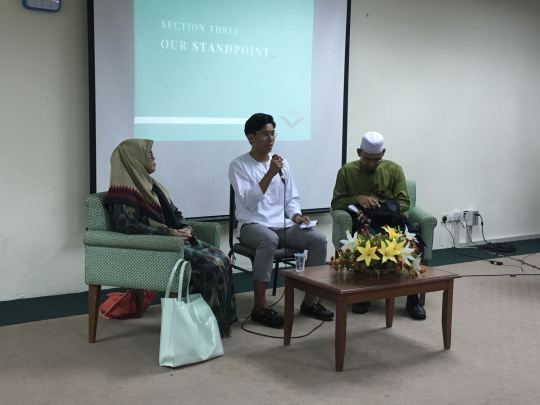
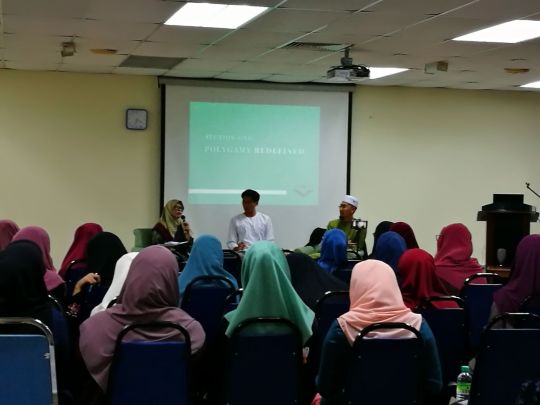
The term ‘polygamy’ has always carried a bad connotation for many, especially for non-Muslims. But does it really deserve the bad reputation it is receiving? Polygamy refers to the practice of having more than one spouse. That being said, the proper term for a man who has more than one wife is called “polygyny” whereas “polyandry” is when a woman has multiple husbands. A typical reaction to polygamy would be rejection from women and acceptance from men. However, objectively speaking we need to reconsider and reanalyse the wisdom behind this issue.
In surah An-Nisa’ verse 3 Allah said:
وَاِنۡ خِفۡتُمۡ اَلَّا تُقۡسِطُوۡا فِى الۡيَتٰمٰى فَانْكِحُوۡا مَا طَابَ لَـكُمۡ مِّنَ النِّسَآءِ مَثۡنٰى وَثُلٰثَ وَرُبٰعَ ۚ فَاِنۡ خِفۡتُمۡ اَلَّا تَعۡدِلُوۡا فَوَاحِدَةً اَوۡ مَا مَلَـكَتۡ اَيۡمَانُكُمۡ ؕ ذٰ لِكَ اَدۡنٰٓى اَلَّا تَعُوۡلُوۡا
If you fear that you might not treat the orphans justly, then marry the women that seem good to you: two, or three, or four. If you fear that you will not be able to treat them justly, then marry (only) one, or marry from among those whom your right hands possess. This will make it more likely that you will avoid injustice. (4:3)
If we were to look back the narrative behind the revelation was about a man who had a female orphan under his guardianship. It was narrated that men tended to marry orphan girls who were under their guardianship out of consideration for either their property, beauty or because they thought they would be able to treat them according to their whims, as they had no one to protect them. After marriage such men sometimes committed excesses against these girls. It is in this context that the Muslims are told that if they fear they will not be able to do justice to the orphan girls, then they should marry other girls whom they like.
Here, Allah has stated the main condition for one to be allowed a polygamous marriage. Which is being just. The question here is, can men be just?
وَلَنۡ تَسۡتَطِيۡعُوۡۤا اَنۡ تَعۡدِلُوۡا بَيۡنَ النِّسَآءِ وَلَوۡ حَرَصۡتُمۡ فَلَا تَمِيۡلُوۡا كُلَّ الۡمَيۡلِ فَتَذَرُوۡهَا كَالۡمُعَلَّقَةِ ؕ وَاِنۡ تُصۡلِحُوۡا وَتَتَّقُوۡا فَاِنَّ اللّٰهَ كَانَ غَفُوۡرًا رَّحِيۡمًا
The phrase “ لَنۡ تَسۡتَطِيۡعُوۡۤا” means forever so to simply put, men can never be just.
So why did Islam allow polygamy?
Before Islam came, polygamy has already existed and it was a practice during the times of Jahiliyyah. However women were not given their rights. Therefore Islam came to legislate polygamy and to put the conditions and limitations for the good of men so that women’s rights are granted and they are put in their proper places as wives.
Now, if we were to look at the western perspective, marriage is a monogamous union between a man and a woman or between two individuals of the same sex. The definition has always remain until now as they believe that it is against women’s rights to equality if a man is allowed to marry more than one wife. It is the principle of having the same number of spouse for each gender. Which means that men are allowed to marry the same number of women as how a woman can marry only one man. They also see it as a problem with polygamy being an abusive relationship with women not being treated fairly, a common misconception that brings polygamy down. The westerns however recognise cohabitation which does not cover legal rights. Comparing this to a recognised marriage, this means that by having legal rights women is protected. Being in a a legal relationship means that you can have protection when something unfortunate happens and this is highly recommended.
Some countries differ greatly in culture, for example, polygamy may be a norm, or perhaps it is even viewed as a disgrace for a man to have only one wife. Another such example is that one has to be married to four wives and portray his just to them, as a prerequisite for being an Imam.
In the end, there are always two extremes with regards to everything. The one group that totally rejects polygamy and the other that imposes it. Ultimately even if rejection is palpable, the authority of polygamy is in the Qur’an. However the perception of it can be changed. To be able to achieve this depends on the men for sure. Women’s rejection has always been because of men’s own fault with the biggest flaw being not following the prophet’s Sunnah.
Finally our two lovely speakers gave an advice to those who are keen to practice polygamy. The first thing is to ask yourself if you can be just. Know that marriage is a sacred thing and that death will not separate you and your spouse because you’ll meet again in the future. So when you marry make that intention to plan for the hereafter together. A practical tip for all the men out there is to be aware that one of the problems leading to rejection from their wives is that he has been communicating with the other woman that he intends to marry. Instead he should show more love toward his first wife and at the same time make dua and wake up for qiyamullail. It’s these actions that will open up their hearts to accept being in a polygamous marriage insyaAllah. Remember that it is very difficult for men to be just because actions are always a reflection of what’s in the heart but know that the Prophet s.a.w himself love Sayyidina Aisha r.a more than his other wives. What matters is your external and physical action that should always be fair to all your wives, for the feeling of love is a gift from God.
A prayer that the prophet always read “اللهم هذا فعلي فيما أملك، فلا تلمني فيما تملك ولا أملك” which means: “Oh Allah, I've done my part that is within my control (to be just externally), so don’t judge me with something that is within your control, not mine (to be just emotionally)” A word for the women from Dr Nora is that if the husband is near-perfect and have no major flaws, if God wills, he will most likely not be irresponsible and should be given a chance. Even if we disagree we have to try to not be selfish and try to work things out because the authority itself comes from the Quran. One of the solution to being fair is when the wives have tolerance between them. The key is to never cease communication with each other, lest the love might diminish.
Polygamy is for solving problems, not creating them. It has always been viewed negatively by society in a context where monogamous relationship is a norm due to men’s selfishness and mistake of not practicing polygamy in the correct way. When Allah allows something, it is for the good of everyone and this is called rahmah thus to bring protection for the women. Allah says اَلرِّجَالُ قَوَّامُوۡنَ عَلَى النِّسَآءِ and the word “ قَوَّامُوۡنَ “ here indicates responsible and NOT superior. May Allah make us among those who practice the religion in it’s best measures.
0 notes
Text
You live to give.
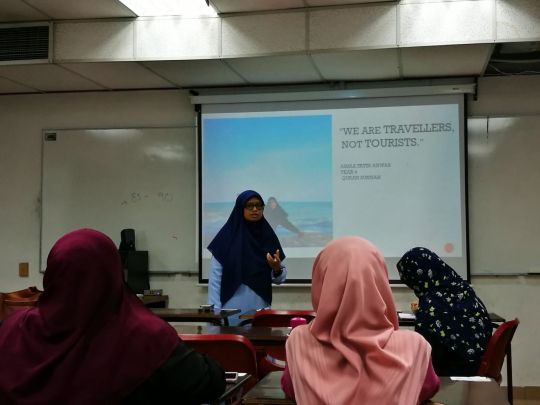
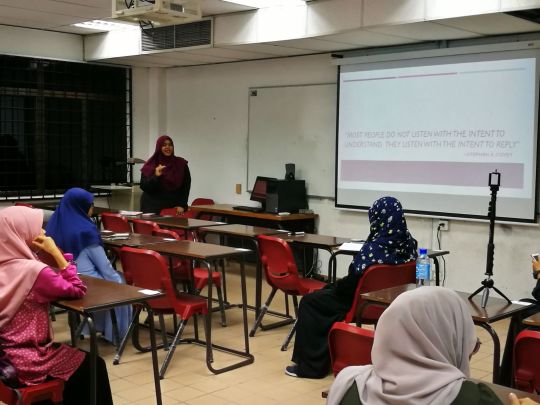
Did you know that hearing and listening is not the same?
Hearing is something that naturally happens when your ears perceive a sound, however, listening is an action that you consciously choose to do.
To listen is a skill in which whatever you do, you will ultimately need it in your everyday life. Our mini series was a very beneficial sharing by sister Ain Saleha. She talked about what it’s like to be a counselor and shared some of the etiquette of being a good listener. One of the important things that she said was, “we listen to understand.” Listening is about empathy and to understand where the person who’s confiding in us comes from. Have you ever come across a situation where you are trying to confide in someone but suddenly you became the confidant instead? Sure, that may have happened at some point of our lives so here’s the thing: sometimes we forget that one trait of a good listener is that he/she does not interrupt.
Another precious point that she shared was that not everyone has the ability to voice out what’s bothering them. Sometimes you have to give a chance to listen to yourself because the truth is, not everyone is going to be there for you. If you don’t know how to find a way to ease yourself, how can you help others?
Not everyone is a good listener but that doesn’t mean you can’t be one. Next time when someone comes to you crying, just lean forward, give a pat on their back and hand them a tissue. And listen.
For our main series we have sister Ainaa Fatin with the topic “We are travelers, not tourist.” Two valuable takeaways that we can learn from her sharing is firstly, it is important to break away from our comfort zone.
Secondly is that we have to realize that travelling doesn’t necessarily mean going to Europe or the Middle East but rather we can still travel around Malaysia despite being in UIA.
In Surah Al-Mulk verse 15, Allah says in the Qur’an:
هُوَ الَّذِي جَعَلَ لَكُمُ الْأَرْضَ ذَلُولًا فَامْشُوا فِي مَنَاكِبِهَا وَكُلُوا مِنْ رِزْقِهِ ۖ وَإِلَيْهِ النُّشُورُ
“He it is who has made the earth easy to live upon: go about, then, in all its regions, and partake of the sustenance which He provides: but [always bear in mind that] unto Him you shall be resurrected.”
May we be among those who make the most of this world to attain His blessings.
0 notes
Text
Appreciating the importance.
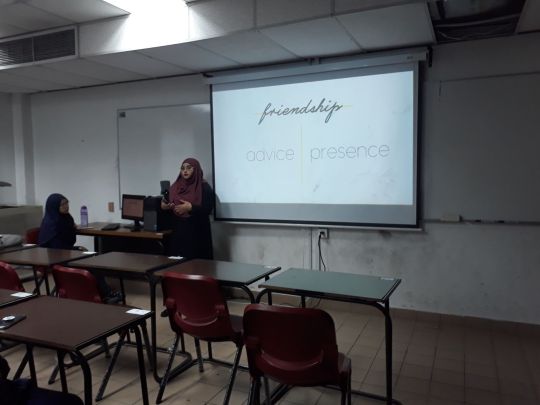
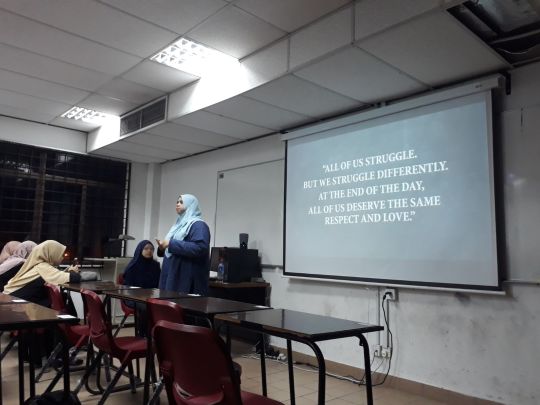
This week's Ihya Jumuah session started off touching on a sensitive topic that, often times, we choose to avoid. Sister Jannah talked about our attitudes in approaching contradicting views: in distinguishing the right and wrong that is separated by a thin line and balancing between moderate and tolerance, what exactly is the appropriate approach?
Then the main topic was on the struggle in facing the departure of our loved ones, which is never an easy feat for anyone. What more when it is about losing our parents, the very people who brought us up with love and care, taught us what life is, and were the only ones who knew us in and out. Sister Norizzati shared with us about the pain of losing both her parents at a young age of 23. An important takeaway is that inevitably the people around us will leave us one day, like it or not. The challenge is to find a way to be strong and know that sometimes we cannot rely on others to heal ourselves.
A lot of times, we overlook the bounties that Allah has given us and that also means appreciating our parents who have always been there, right in front of our eyes. Before it’s too late, let’s take this time to thank them and do good to them. Allah says in Surah Al-Isra’ verse 23: {وَبِٱلْوَٰلِدَيْنِ إِحْسَٰنًا} May Allah grant them the highest level of paradise and may He make it easy for them in educating us, Allahumma ameen.
0 notes
Text
Religious tolerance: Where do we draw the line?
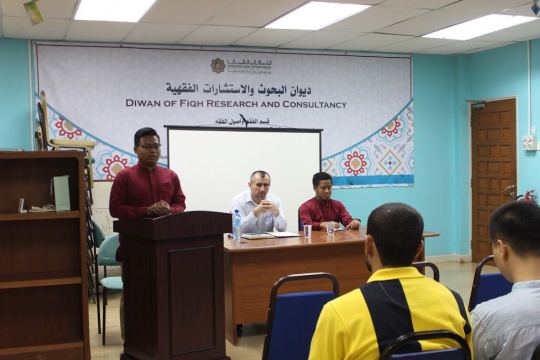
Living in a community where differences can be seen clear and similar, Muslims and Non-Muslims are bound to interact with one another. Closely related to our last ihya’ topic of Pluralism and Plurality, Dr Fatmir talks about Religious Tolerance in the recent Mawqif and why Muslims should be more aware of this concept.
Q. What exactly is religious tolerance?
Religious tolerance is the willingness to accept behaviours that are different from your own although you might not agree with them. [Cambridge] It is the attitude of a person’s belief towards other people’s religious belief and how we want to relate to them is through accepting that all religion is valid and true. This is of course the interpretation of religious and social conservatives. On the other hand, from the Islamic perspective of religious tolerance it means to make a person’s life easy and to respect the creeds of others.
Q. Why is religious tolerance important?
As much as we believe that we are the best for the akhirah, we still need others. This is because it is our task and duty to convey the message to others and to be able to achieve this, we need to know them and become one with them. Not be a part of them but rather to live with them and tolerate them as we would like to be tolerated.
Being a community that has always been under the microscope and claimed as barbaric and violent we need others to listen to us. And this is impossible without tolerance. To tolerate will not only make us open our horizons to acquire more knowledge about others but to also appreciate their forte. It is our responsibility to spread the message and this is why we tolerate.
Q. How do we tolerate differences in intra-religion?
Of course, before we convey to Non-Muslims, we must ensure that the neighbours of Muslims have the correct understanding of Islam. But despite being Muslims we have a lot of differences. We have minor differences which is between the mazhab and the major ones such as sunni and syiah. The answer here is to focus on what is common and to get rid of the differences and that is to hold on to the fact that we believe in the same God and the Qur’an. Even within a family, there are differences but instead of out casting them, we tolerate and not make it into a big issue.
Q. To what extend do we tolerate the differences?
To the extent of not harming the fundamental principle. We tolerate so that we can live harmoniously and not more than that. We have territories and we don’t need to allow them to interfere. That is why we need to know our boundaries.
Q. Is Atheism a religion?
Based on the western’s definition of religion which is “a system of belief and worship”, it is a religion. Atheist claimed that they don’t believe in God but they worship money. They love the money so much that they would commit suicide because of the dunya. To them, the term religion is weak therefore according to them, religion here refers to the material aspect of the dunya and that is why they say we are all the same. Islam however think that Atheism is not a religion. This is on the basis that Allah s.w.t said { إِنَّ الدِّينَ عِندَ اللَّهِ الْإِسْلَامُ}.
Q. When did the term ”Religious tolerance” start to rise in the West?
Religious tolerance is actually the response to intolerance and how they look at religious communities. The problem was initially the Christians who refused to live with others thus to be able to respond to the injustice done by religious people they came up with this concept. This tolerance was initially referring to the cultural differences before targeting religion directly because they did not realise that culture and religion is highly linked together.
Q. What would be the best response towards Muslims who accept Religious Pluralism as a means of tolerating others?
As tricky and confusing as the term Pluralism and Plurality is, we need to educate Muslims about the correct understanding of the term. Pluralism is the western perspective whereas we believe in Plurality. The difference is that we accept others as they are but we reject the idea of what they claim as we claim. We need to draw a distinction in the Islamic approach and the western approach.
Thus to conclude we can say that religious tolerance is important for us to be able to fulfil our responsibility. In Surah Al-Hujurat { لِتَعَارَفُوا يَا أَيُّهَا النَّاسُ إِنَّا خَلَقْنَاكُم مِّن ذَكَرٍ وَأُنثَىٰ وَجَعَلْنَاكُمْ شُعُوبًا وَقَبَائِلَ } Allah talks about how He have created the world in diversity so that we can learn from each other. The most important thing is to not become apologetic of our religion in the sense that we accept what they claim as ours. We need to know our position and then we can easily draw a distinction of what we have and what others are having. Sometimes without realising it we accept their claims and this should not happen. When we are firm people will respect us more and when we make them understand what God is according to Islam and show them the correct way of doing things they will come by themselves and understand that Islam is the right way of life.
2 notes
·
View notes
Text
History and Diversity
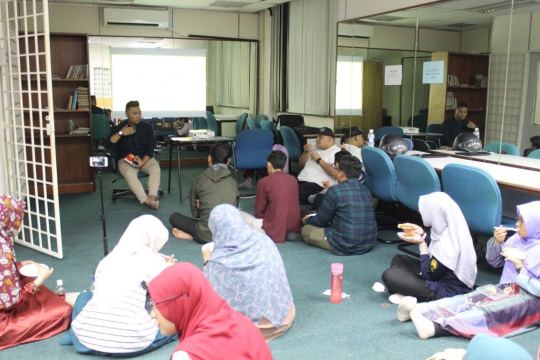
After a few sessions of Ihya Jumuah, we finally had our Grand Ihya for this semester. Even though there was a slight problem regarding our venue the day before the event, we still managed to secure a place to proceed with, Alhamdulillah. (P.s: Shout out to our sister and ex-committee member, Fathiyah, whom this wouldn’t have been possible without. Barakallahu feek!)
Starting off the event, sister Aqilah Hulaimi shared the reasons she took History as her major. Knowing that not many are fans of History (which probably includes you!), it was interesting to learn the curious reasons why some people are intrigued to pursue History. The takeaways are simple yet hold so much meaning. To put it briefly, it is all about filling the void of not knowing the past or even your own origins, and learning from as well as acknowledging previous occurrences and rectifying the mistakes so that gruesome history will not be repeated.
For our main series, brother Nurfirman talked about a topic that has been brought to the spotlight, namely, “Religious Pluralism”, which is notably different compared to “religious plurality”. This may seem like a new topic but it is not. In fact, the earliest form of plurality in Islam was during Rasulullah’s time when he, s.a.w, united the different tribes under a single state. A lot of people seem to be confused or reject the concept of religious plurality but in truth, it is in the Qur’an as Allah has mentioned in Surah Al-Hujurat verse 13, which means { O mankind, indeed We have created you from male and female and made you peoples and tribes that you may know one another.}
To clear the misconception, religious plurality is to welcome the encounter of the diverse religions and acknowledge that they have the freedom to believe in their own understanding of the truth, albeit not to accept or acknowledge that they are the truth all the same. This is where it is constantly misunderstood. We must know that Islam does not accept pluralism but rather acknowledges religious plurality. The word (لِتَعَارَفُوا) in the verse shows that we are encouraged to learn about one another, and delve deeper into understanding the different religions. Firman emphasized on this and how it is important to live harmoniously with other cultures and religions in our society. If we were to look back at history, we can see how Rasulullah s.a.w brought together the different Arab tribes who used to absolutely oppose and dispute with one another. This shows how Islam highly encourages religious plurality.
But why is this important? Because without plurality, Muslims are vulnerable to hypocrisy — to label other religions as kafir and sometimes even amongst intra-religion, but conversely give zero toleration when they oppose or criticize back. Such attitude can be avoided when they accept that people have their own rights to believe and practice what they want, and also understand that each diversity comes with similarity that we should embrace, not focus on differences.
As Singaporeans living in a multi-racial country, we believe that we Muslims should grab this opportunity to learn more about the different cultures because then only will we see that Allah has created the world for us to explore and discover which ultimately will make us appreciate more that Islam is a beautiful religion.
0 notes
Text
Love and prayers
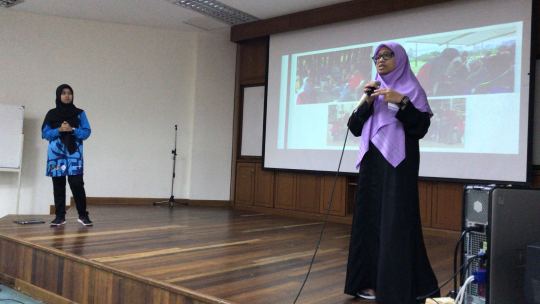
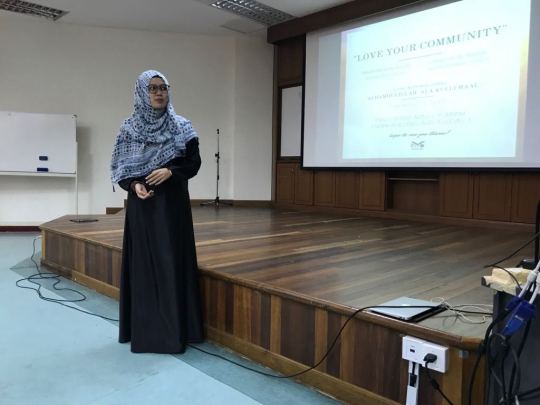
In our last ihya’ we had a wonderful sharing session by Raudhah Shahbudin and Ainaa Fatin for our main series along with Tan taking over the mic for our mini-series.
Having been involved in many social work, Raudhah and Ainaa talked about their experience in going to Aceh for community service. They also talked briefly about Majulah and doing internship in dealing with juvenile delinquents and learning how to handle the problems associated to them. Their message to everyone was simple yet meaningful: to always love and care for everyone because who knows one day we might also need them.
Prophet Muhammad s.a.w said: (من لا يرحم لا يرحم) "He who does not show mercy to others will not be shown mercy".
The mini-series entitled “Alhamdulillah ala kulli hal” was the sequel to the first ihya’. Relating to the story of the incidence of Hubabah and Ustazah Halimah Idrus in the bus and how she still said her gratitude to Allah s.w.t despite the calamity, Tan brought up a few important things that we should know and hold on to in our lives; which is the significant of “yaqin” (to have faith in Allah). Most of the time it’s easy to simply say that we have faith in Allah but during hardship, we tend to lose hope in trials and tribulations. As Muslims, we often overlook the fact that having faith is the most powerful thing a Muslim can have. The faith that we have inside of us can bring us wonders that our mind can never think of. Thus goes the same for our dua’. When you call out to Allah and cry your heart out with hope and faith for His help, He doesn’t disappoint. The significance of faith can never be justified through words. Hence, we would like to share an amazing story that we feel everyone should listen to. It’s about a story about how Allah call out His whole army to grant the prayer of a grandmother.
https://www.youtube.com/watch?v=zOh8Q3XBhiw
Tan also shared with us about the possibility of “tawassul” (the use of wasilah to obtain Allah’s favour through our actions) and ended her sharing session by reminding us that one should never think too highly of himself. We may feel that we are better than a certain someone but we can never know if the position we are in now may be permanent or not. It could be that today we perform our prayers on time and never miss a single salah but one day He could take away the guidance that He have granted us, wa nauzubillahi minzalik. Always remember that everything we are able to practice as a Muslim, it is all because of His mercy. May Allah protect us all and make us among those who are sincere, Allahumma ameen.
0 notes
Text
Alhamdulillah ala kulli
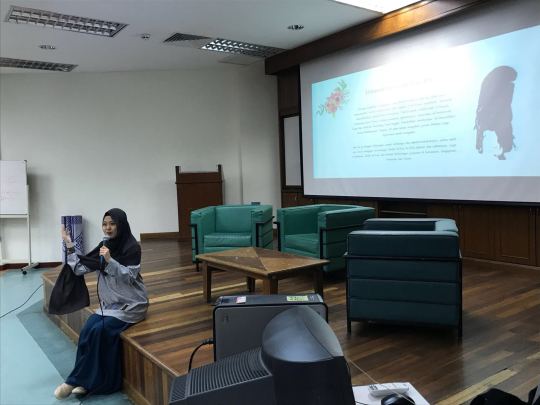
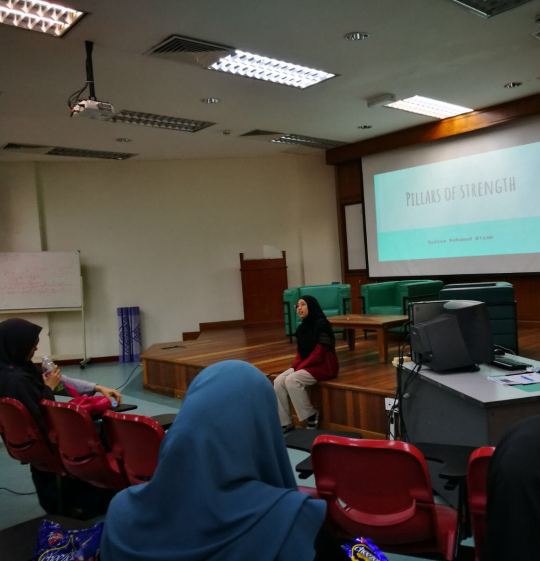
Bismillahirrahmanirrahim.
Our first ihya’ for this semester was a very good start for the team. The event started out with our harmonious recitation of Surah-Kahfi. As minutes passed by, more ASIIUMers started to join us. What was funny though was how after we ended our recitation we turned around to find that all of our audiences were female. Hmm... Maybe we can propose to the ART committee to start an all-girls event?
Tan Nurul E’zzati took over the stage for our mini-series session with a very wonderful story from her favourite book entitled “Bidadari Bumi”. It’s a book written by Ustazah Halimah Alaydrus which consisted stories of nine pious women including some of our Ummahatul Mukminin; Khadijah bt Khuwailid (r.a), Fatimah bt Muhammad (r.a), along with other great women such as Asiyah binti Muzahim and Maryam binti Imran. The story that she shared with us was about the friendship of Ustazah Halimah Alaydrus and a woman called Hubabah Bahiyyah on how they met.
One day Ustazah Halimah asked Hubabah the reason why she hated being praised.
She answered: Tidak ada yang lebih mengetahui diri kita selain Allah dan diri kita. Dan kau tahu dinding penghalang terbesar manusia dengan tuhannya adalah hawa nafsunya sendiri. Hawa nafsu kita mudah sekali terlena dengan apa yg diharapkannya. Pujian adalah salah satunya. Tatkala hawa nafsumu kenyang dengan pujian, ia pun menjadi kuat. Dan ketika dia kuat engkau akan menjadi kesulitan untuk menyalahkannya.
Ustazah Halimah then said, “but even our scholars would smile and make dua for those who complimented them,” because she remembered that during the first meeting she was given the cold shoulder despite giving hubabah praises without a word of criticism.
She replied: Mereka adalah orang-orang yang kuat. Mereka telah menang dan bukan lagi seperti kita yang masih lagi di medan pertempuran.
Subhanallah, look at her humbleness.
Another story that Tan shared with us was about the importance of being grateful with everything that Allah has given us. A lot of times we forget that the word “Alhamdulillah” is meant not only for good times but also to use it when we face challenges and difficulties. Thanking Allah for the nikmah that He has given us and thanking Him when He tests us, knowing that He still remembers us.
She also added that a good believer is of those who sees the good in everything, a reminder that we all need.
Next was the main topic for that ihya' which was a very intimate sharing by our enthusiastic first year sister Syazaa. She shared with us about her challenging past and how she was able to go through it.
Amongst the important messages that I can get from her sincere delivery was how important it is to keep ourselves close with the Qur’an. Connecting with the Qur’an is a gift from Allah but to obtain this gift, we need to show Allah that we want that gift.
She also highlighted about having good assumptions in Allah swt. Her sharing ended with a very powerful food for thought, “Syazaa, you selalu husnu zhon dengan orang tapi you tak husnuzhon dengan Allah.”
May Allah make us among the people who always have good assumptions towards Him and keep us guided and close to His Book always, Allahumma ameen
0 notes
Text
Women in Leadership
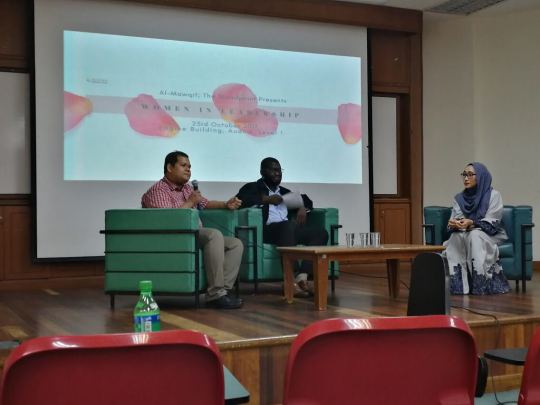
Bismillahirrahmanirrahim.
Have you ever wondered if a woman is capable of being a leader? If yes, to what extend is her capability while empowering the world? Or what are the pros and cons of having a woman as a leader and does Islam encourages having woman on the lead in accordance to the Syariah? Will her leadership be much different compared to the leadership of a man? But what exactly is the yardstick in opting for a woman as a leader in this world?
The topic of women has always been something for people to talk about. Whether it’s about women’s right, women in leadership, or even the role of women generally is always considered as a controversial issue. In the past, these could have been a taboo. However in this modern context people are voicing out their opinions and putting in a lot of effort in trying to give women a better place in this world.
The forum started out with the question of when women started taking the role of leadership and why it became an issue. Feminism has always been a topic that had a lot of angry responses. People had negative opinions and there were a lot of frustration on this. Our politics is very much anti women. Over the years there has been a start of female politicians running for presidential candidate however these female politicians feel the need to show the public how tough they are and they are always under pressure to portray toughness.
The question here is: Why does a woman need to be tough? Toughness is a masculine trait that has brought a lot of destruction throughout the history. Example is the First World War that had repercussion on Manliness and gender role and masculinity playing a part in its history. Dr Luqman also emphasised on how he believes that everything moves according to nature. It’s either we break it or succumb to it and live according to the nature. Why is it that men have to act like they are tough and women are shy? Is it the behaviour based on coincidence or is it because of nature? He shared with us a story about his female manager who asked his favour to talk to his male colleague because she was scared to talk to the men when the reality is she is the manager and should have superiority over them. This story may actually indicate that shyness is a natural phenomenon that was built in women.
Dr Khairil said that here the change is not about bringing woman in leadership but challenging the culture that has been defining our social political structure throughout history, and to be able to achieve this, it requires the participation of not only women but also men. Female leadership is one of the solution provided that it actually succeed in bringing a different culture and not just having a woman saying she wants to be president. Because to just make such claims will only get people frustrated and they will start questioning how women can bring a different value to our politics. The politics of men has been so destructive and we have the politics of aggression, politics about toughness and politics about showing how one country is more powerful than the others. Which is why the politicians have to move beyond this and in order to achieve this we need a more feminine spirit.
Another aspect that we should look at is the verse from the Surah An-Nisa’ verse 34, Allah says in the Qur’an {الرِّجَالُ قَوَّامُونَ عَلَى النِّسَاءِ}. Here the context of the word “قَوَّامُونَ” in the verse has to be first clarified. Is the term restricted to the house or is it open to public roles and authoritative position? Hence it is important to understand that the interpretation of the Qur’an should be based on the society that we are living in so that we can live in harmony.
Islam does not prohibit women from being leaders because if we look at one perspective, women are usually the ones leading the disciplinary part of the children aside from their job as taking care of the household welfare. On another hand, if women were to hold leadership position then how does she cope with her responsibility towards her family and herself alongside her responsibility towards the country and the people? That is why women cannot be a khalifah and this is also the reason why we see man rising and growing to become CEO and bosses because the pressure is on the women to perform multiple roles.
If we were to look back at the Islamic history, the greatest example of women in leadership is Khadijah r.a who showed great leadership in her business as an entrepreneur. Once, Umar ibn Al-Khattab r.a appointed Samrah bint Nuhaik as an overseer of the market as the leader and she would carry a whip in the market to discipline people. Some of the Sahabah saw that as a sign of authority.
Patriarchy plays a very important factor in recognizing women’s position in leadership. In some community, for example the Malay community, patriarchy is very subtle and not visible because we see women in front desks and are allowed to voice out regularly, however, generally most of society are considered pro patriarchal. It wasn’t that long ago when the Malay Muslim society are checked off the patriarchal mindset compared to the old who still believes that girls do not have to go to school because they will eventually be married off and end up in the kitchen.
However women is still under the spotlight in many ways. For example in IIUM itself female students always get scrutinized for their dress code. Compared to the boys who wear t-shirts and sandals and do not get told off. Another example is gang rape cases where the rapist says it’s the girl’s fault. This statement actually makes you wonder the mentality this kind of people have. Sadly women are always given the blame.
If anyone were to argue that patriarchy is natural, it’s something that can be challenged. Because gender roles cannot be natural. It is conditioned as male and female is biological and it cannot be changed whilst gender role is socially constructed. It requires performance and one needs to perform their gender role in order to be male or female. It is important to distinguish between sex and gender role.
Over the years, the interpretation of gender indication has dictated towards men. Comparing this to the Arabic language, in the Qur’an where gender plays a very important role in determining masculinity and femininity. Muslims know that God is referring Himself as ‘him’ and this does not mean that He is a man but the nature of the language.
Hence, considering the viewpoint of the Islamic and secular/western perspective, we can say that women is capable of becoming a leader. Not only can women bring a different and fresh change in the societal perspective but they can also instil the feminine aspect in the pro patriarchal environment. Just like in the hadith where Prophet Muhammad s.a.w said {كُلُّكُمْ راعٍ وكُلُّكُمْ مسئولٌ عنْ رعِيَّتِهِ} which means everyone is a leader and is responsible for someone under him.
1 note
·
View note